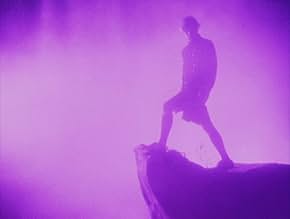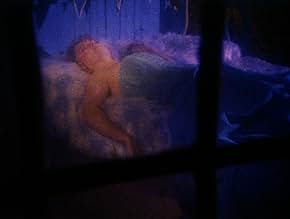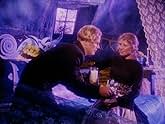Agrega una trama en tu idiomaThe wary residents of a 19th century mountain village must tread carefully and speak softly lest they cause an avalanche. Sexual frenzies teem in this world of repression, setting off incest... Leer todoThe wary residents of a 19th century mountain village must tread carefully and speak softly lest they cause an avalanche. Sexual frenzies teem in this world of repression, setting off incestuous love triangles with deadly consequences.The wary residents of a 19th century mountain village must tread carefully and speak softly lest they cause an avalanche. Sexual frenzies teem in this world of repression, setting off incestuous love triangles with deadly consequences.
- Dirección
- Guionistas
- Elenco
- Premios
- 1 premio ganado en total
Andrea Von Wichert
- Townsperson
- (as Andrea Wichert)
Opiniones destacadas
This is the second Guy Maddin film that I've seen (the other being "Twilight of the Ice Nymphs") and in both cases, the films wore out their welcome about half an hour in.
I enjoy the offbeat style of the humor, the intentional visual stylization patterned after early silent films (this one reminded me particularly of the work of Melies), and I have no problem with the flat acting style (which is an honest homage to early film acting) or the coloring (which, again, is based in films of yesteryear). Where Maddin's films run into trouble is, as soon as the novelty has worn off and the character based introductory jokes have played out, there is simply nothing beneath it all for the film to fall back on.
The story is actually very simple, yet it is so relentlessly bizarre that it borders on surrealism. So, either there is no deeper meaning to the story, or it's so far buried that it eludes me during the actual viewing of the piece. (Not that one can't come up with various things after the fact; I simply doubt that the director intended them or had any control over them if I can only interpret the vaguest elements of the story.)
The concept of Oedipal lust and such simply aren't enough to sustain a film of this length. Not in the way that they are handled anyway. The film is absolutely brilliant up until Johann dies. It then withers quickly, as the last real belly laugh comes in the first few minutes of "Part Two." The remaining hour or so limps along to a decent though unsatisfying end.
Guy Maddin is without doubt a clever and unique director, and I look forward to the day when I can say that I've seen him at his best. But he's far from it in this film in my opinion.
Endless homages to early films aren't enough to last 100 minutes... And perversity caused by child rearing needs to be handled more cleverly to take up the slack...
I enjoy the offbeat style of the humor, the intentional visual stylization patterned after early silent films (this one reminded me particularly of the work of Melies), and I have no problem with the flat acting style (which is an honest homage to early film acting) or the coloring (which, again, is based in films of yesteryear). Where Maddin's films run into trouble is, as soon as the novelty has worn off and the character based introductory jokes have played out, there is simply nothing beneath it all for the film to fall back on.
The story is actually very simple, yet it is so relentlessly bizarre that it borders on surrealism. So, either there is no deeper meaning to the story, or it's so far buried that it eludes me during the actual viewing of the piece. (Not that one can't come up with various things after the fact; I simply doubt that the director intended them or had any control over them if I can only interpret the vaguest elements of the story.)
The concept of Oedipal lust and such simply aren't enough to sustain a film of this length. Not in the way that they are handled anyway. The film is absolutely brilliant up until Johann dies. It then withers quickly, as the last real belly laugh comes in the first few minutes of "Part Two." The remaining hour or so limps along to a decent though unsatisfying end.
Guy Maddin is without doubt a clever and unique director, and I look forward to the day when I can say that I've seen him at his best. But he's far from it in this film in my opinion.
Endless homages to early films aren't enough to last 100 minutes... And perversity caused by child rearing needs to be handled more cleverly to take up the slack...
Will wonders never cease? Here is a DVD that I never thought I'd see. Guy Maddin's brilliant and hilarious (particularly for early film buffs) `Careful.' The plot and style of this film have been well explained by other commentaries on this page and elsewhere, so there's no need to go over it again. My favorite comment about it is that it is like a Ricola ad gone horribly, horribly wrong. Suffice it to say that the DVD is an improvement in image quality. While many of the images are intentionally vague, grainy or indistinct by the choice of the filmmakers, I get the impression that these effects are more clearly conveyed in the DVD. In a spoken commentary track with Maddin and screenwriter George Toles (new to this DVD, and obviously not possible on the VHS edition), Maddin admits that he wanted to add an effect through use of the color controls during the digital transfer, but resisted that temptation in order to let this DVD stand as a faithful representation of the film. While the effect he had in mind might have been interesting, I'm still grateful to him for his restraint.
Maddin claims in his commentary that people often obliquely criticize the performances of the actors in this film while, at the same time, telling him how much they like it, placing him in the position of defending those performances. Maddin states that he absolutely stands by the performances in this film, and that the actors gave him precisely what he asked for. This should dispel any doubts among people who see this film about the unusual, stiff delivery of lines, which might lead people who know nothing about the cast to suspect they are amateurs, which they are definitely not. This sort of line reading can be seen in some of the very earliest talkies. The antiquated sound of this film, along with its look, is all of a piece, and completely intentional, right down to the fake patina of noise added to the mono soundtrack. Maddin does regret some of the props and effects which had to be done on the cheap, due to budget restraints. Who knows how much more bizarre and fantastic it might have looked with a larger budget? On the other hand, it might have lost some of its unique charm. As it is, it's a wonderful piece of work that I find unforgettable, and that has remained vivid in my memory years after first seeing it. Copies of this DVD aren't to be found in abundance, and I don't know how long it will stay in print. If you like this film, do get this DVD now, and tell anyone you know who likes unusual films about it.
Near the end of the film, which hints at a continuation of the story, Maddin says that he may make that sequel some day. I don't know if he was serious about it or not, but I'd sure love to see it.
Maddin claims in his commentary that people often obliquely criticize the performances of the actors in this film while, at the same time, telling him how much they like it, placing him in the position of defending those performances. Maddin states that he absolutely stands by the performances in this film, and that the actors gave him precisely what he asked for. This should dispel any doubts among people who see this film about the unusual, stiff delivery of lines, which might lead people who know nothing about the cast to suspect they are amateurs, which they are definitely not. This sort of line reading can be seen in some of the very earliest talkies. The antiquated sound of this film, along with its look, is all of a piece, and completely intentional, right down to the fake patina of noise added to the mono soundtrack. Maddin does regret some of the props and effects which had to be done on the cheap, due to budget restraints. Who knows how much more bizarre and fantastic it might have looked with a larger budget? On the other hand, it might have lost some of its unique charm. As it is, it's a wonderful piece of work that I find unforgettable, and that has remained vivid in my memory years after first seeing it. Copies of this DVD aren't to be found in abundance, and I don't know how long it will stay in print. If you like this film, do get this DVD now, and tell anyone you know who likes unusual films about it.
Near the end of the film, which hints at a continuation of the story, Maddin says that he may make that sequel some day. I don't know if he was serious about it or not, but I'd sure love to see it.
I really like Maddin. I like the way he thinks visually first. Narrative is not only woven into and communicated by cinematic means, but his characters live in a similar world. They experience the world, the same way we experience the film: by what some call a surrealistic dream world. It is not. Rather it is a world wholly driven by laws, laws we understand because they are rooted in film worlds we have visited.
I have two of his films on my "must experience before you die" list. This one is narratively less subtle and powerful than those. He makes a trade-off by investing in what is often - including here - called "German Expressionism." Actually, the model is German mountain films, a quite different beast: one that is more genuinely pre-noir.
The world behind those films has a people in tune with a nature that limits their lives, often controlling. American noir would later merge this collection of laws with the narrative conventions built into the act of viewing. What this film does is insert itself before that development. It is pre-noir tragedy with noir-like conventions, cast using those German pre- noir images.
It is a stretch to merge German notions of superior harmony with the mountain homeland with the Nazi comfort with the cruelty of nature. But heck, others do; there is the tradition of Riefenstahl's mountain films and then her similarly inspired Nazi propaganda; and after all, films like this encourage such stretches. And a similar stretch goes in the "White Ribbon" direction, with nature and its German bond with sexual repression behind what happened. Herzog continues this even today.But all that is predicable and easy to read, compared to Maddin's deeper stuff.
Ted's Evaluation -- 3 of 3: Worth watching.
I have two of his films on my "must experience before you die" list. This one is narratively less subtle and powerful than those. He makes a trade-off by investing in what is often - including here - called "German Expressionism." Actually, the model is German mountain films, a quite different beast: one that is more genuinely pre-noir.
The world behind those films has a people in tune with a nature that limits their lives, often controlling. American noir would later merge this collection of laws with the narrative conventions built into the act of viewing. What this film does is insert itself before that development. It is pre-noir tragedy with noir-like conventions, cast using those German pre- noir images.
It is a stretch to merge German notions of superior harmony with the mountain homeland with the Nazi comfort with the cruelty of nature. But heck, others do; there is the tradition of Riefenstahl's mountain films and then her similarly inspired Nazi propaganda; and after all, films like this encourage such stretches. And a similar stretch goes in the "White Ribbon" direction, with nature and its German bond with sexual repression behind what happened. Herzog continues this even today.But all that is predicable and easy to read, compared to Maddin's deeper stuff.
Ted's Evaluation -- 3 of 3: Worth watching.
I recently watched the film, Careful, by Guy Maddin on television and found it to be very interesting indeed. The person introducing the film called Maddin a Canadian David Lynch and while both directors do have a certain flair for the unusual, I believe Lynch to be a surrealist while Maddin's style to be something else entirely. Granted, Careful is the only film of Maddin's I have seen except for excerpts and press for The Saddest Music in the World, but his style, at least in this film, is one of sentimentality and homage. I have seen plenty of German Expressionist films and Careful would seem to fit right into that mold. I myself have often toyed with the idea of producing a film in the Expressionist style if only for the exercise of it. Maddin has produced an Expressionist film in the year 1992 which flawlessly mimics the films of Ufa, Wiene, Murnau, and Lang from the early 20th century. Any viewer, even those versed in early Expressionism, who would happen across this film without any context would be forgiven for mistaking it to be an actual 80-year-old film, so true is Maddin's style, so exacting is his pacing. Full frame color tinting, sound stage shooting, post-produced soundtrack, rigid acting style, and obsolete directorial choices, combine to provide the viewer with a disturbing portrait of repression, duty, and mountain goats. This film is incredible!
I love Guy Maddin's work and this is my favourite of his films. It's odd and unsettling and it sticks with you long after you've watched it.
It's definitely not the most accessible of his works, but I like it. It's been described as a "pro-repressionist" movie, but I don't think that's entirely accurate.
The people portrayed in the village are deeply repressed and one small push makes their whole stack of cards morals come tumbling down. It's tale of three brothers and their trials and tribulations.
Their father is deceased and one brother, Vince Rimmer as Franz, is an invalid confined to the attic, who can do little more than watch as his brothers are tempted and run amok.
First Brent Neale as Johann, then Kyle McColloch as Grigorss give in to their desires and forbidden longings with tragic consequences. Kyle McColloch is a Maddin regular and he shines here.
Engagements are broken, people have knife fights and their mother is seeking to re-marry.
It's definitely not the most accessible of his works, but I like it. It's been described as a "pro-repressionist" movie, but I don't think that's entirely accurate.
The people portrayed in the village are deeply repressed and one small push makes their whole stack of cards morals come tumbling down. It's tale of three brothers and their trials and tribulations.
Their father is deceased and one brother, Vince Rimmer as Franz, is an invalid confined to the attic, who can do little more than watch as his brothers are tempted and run amok.
First Brent Neale as Johann, then Kyle McColloch as Grigorss give in to their desires and forbidden longings with tragic consequences. Kyle McColloch is a Maddin regular and he shines here.
Engagements are broken, people have knife fights and their mother is seeking to re-marry.
¿Sabías que…?
- TriviaRebecca Gibson's debut.
- ConexionesFeatured in Guy Maddin: Waiting for Twilight (1997)
Selecciones populares
Inicia sesión para calificar y agrega a la lista de videos para obtener recomendaciones personalizadas
- How long is Careful?Con tecnología de Alexa
Detalles
Contribuir a esta página
Sugiere una edición o agrega el contenido que falta
























